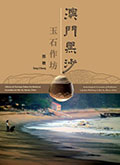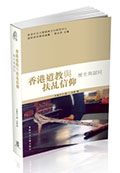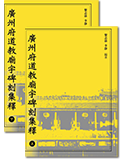 Archaeological Excavation of Prehistoric Lapidary Workshop in Hac Sa, Macao, China Archaeological Excavation of Prehistoric Lapidary Workshop in Hac Sa, Macao, China This is a catalogue and research monograph on the 4,000-year-old lapidary workshop settlement found at Hac Sa, Macao. It details the results of the archaeological excavation conducted by CUHK and the University of Hong Kong in 2006. The archaeological evidence from Hac Sa suggests that its lapidary artisans had mastered the use of advanced rotary machinery in the production of quartz rings and slit rings. The stone bearings excavated at the site are particularly significant. This publication constitutes an unprecedented systematic analysis of prehistoric bearings in China. It includes a preface written by Professor Jao Tsung-I and the paper entitled "The Academic and Social Significance of Hac Sa Site in Macao" by University of Hong Kong Professor Cheng Wai-ming; 340 pages. To place an order, please contact the Centre for Chinese Archaeology and Art.
 Newsletter of Chinese Language (Volume 92 Number 2), T.T. Ng Chinese Language Research Centre Newsletter of Chinese Language (Volume 92 Number 2), T.T. Ng Chinese Language Research Centre
The Newsletter of Chinese Language (Volume 92 Number 2) was released in July 2013 and comprises four papers. Three papers are on Chinese Language Learning and Teaching, and the other is on Chinese Language Studies. PDF copies of all four papers can be downloaded via http://www.cuhk.edu.hk/ics/clrc/.
Hong Kong Daoism and the Cult of Spirit-writing, Centre for Studies of Daoist Culture
 The first title in the Centre for Studies of Daoist Culture's Chinese series, Hong Kong Daoism and the Cult of Spirit-writing by Shiga Ichiko, a professor at Ibaraki Christian University in Japan, was published in September 2013. The book examines the faith, functions, and historical and ethnographic development of spirit-writing in the Daoist temples of Hong Kong and its relationship with the religious culture of the Pearl River Delta region. It does so through analysis of information gathered from interviews, field study, gazetteers, temple publications, and historical and literary texts. The first title in the Centre for Studies of Daoist Culture's Chinese series, Hong Kong Daoism and the Cult of Spirit-writing by Shiga Ichiko, a professor at Ibaraki Christian University in Japan, was published in September 2013. The book examines the faith, functions, and historical and ethnographic development of spirit-writing in the Daoist temples of Hong Kong and its relationship with the religious culture of the Pearl River Delta region. It does so through analysis of information gathered from interviews, field study, gazetteers, temple publications, and historical and literary texts.
Order online from The Chinese University Press.
Collection of Stele Inscriptions of the Daoist Temples of Guangzhou, Centre for Studies of Daoist Culture
 Collection of Stele Inscriptions of the Daoist Temples of Guangzhou, by Professor Lai Chi-Tim and Dr. Li Jing, will be published this month (October 2013) by the Zhonghua Book Company of Beijing and Joint Publishing of Hong Kong. The book is a thorough collection of the stele inscriptions in the Daoist and local temples of Guangzhou, including those in 121 temples belonging to Guangzhou County and dating from the Song Dynasty to the end of the Qing era (1910). It constitutes a compendium of 282 epigraphic documents on the historical activities of these religious institutions. The stele inscriptions provide abundant information on the society, economy, history, religious institutions and thought systems of the period, and are therefore of paramount significance to the study of the history of local Daoism and the social history of religions. Another major contribution of this work is its inclusion of 112 inscriptions gathered during field research on 48 Daoist temples. These inscriptions amount to 40% of the book's total material. Collection of Stele Inscriptions of the Daoist Temples of Guangzhou, by Professor Lai Chi-Tim and Dr. Li Jing, will be published this month (October 2013) by the Zhonghua Book Company of Beijing and Joint Publishing of Hong Kong. The book is a thorough collection of the stele inscriptions in the Daoist and local temples of Guangzhou, including those in 121 temples belonging to Guangzhou County and dating from the Song Dynasty to the end of the Qing era (1910). It constitutes a compendium of 282 epigraphic documents on the historical activities of these religious institutions. The stele inscriptions provide abundant information on the society, economy, history, religious institutions and thought systems of the period, and are therefore of paramount significance to the study of the history of local Daoism and the social history of religions. Another major contribution of this work is its inclusion of 112 inscriptions gathered during field research on 48 Daoist temples. These inscriptions amount to 40% of the book's total material.
The book provides the name and a short description of each temple and the title of each stele in that temple, along with related information, the complete text of each inscription and a short presentation on its author, a philological study, and other data. The "Temple Description" section furnishes a concise but comprehensive explanation of the historical development of each temple and of the decoration of its sacred altars and statues. Such information is missing from previously published collections of stele inscriptions, and thus constitutes an extremely useful supplement. The "Philological Study of the Inscriptions" is mainly a presentation of the content of the epigraphy, accompanied by its evaluation. The section also includes a brief biography of the author of each inscription.
To allow ease of reference and comparison between sources, both the temples and inscriptions are systematically numbered and organised, and the book includes a table of contents and index. To allow the convenient search of information related to a stele inscription, the inscriptions are catalogued in an appendix in four lists according to date, order and number of strokes (bihua), title of the stele and the author's name, and numerical order.
This book will be of interest to everyone interested in the history of Chinese religion and religious buildings (including Daoist and popular temples), local society and the history of Guangzhou. It will be of particular interest to those who wish to understand the development of Daoism from the Song to Qing Dynasties and its relationship with local temples. Finally, it is also targeted to the general reader interested in traditional beliefs and Chinese temples.
Collection of Stele Inscriptions of the Daoist Temples of Guangzhou is being published in both a Chinese edition and international edition by the Zhonghua Book Company of Beijing and Joint Publishing of Hong Kong. Both editions are divided into two volumes in 16 k colour-printed format. The second volume contains colour plates, including maps, temple plans and photographs of the steles. The majority of the photographs were taken during the authors' field trips, and constitute valuable documents being made available to the public for the first time.
|
















